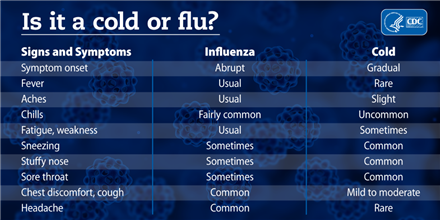

Flu Season Reminders - Cold vs. Flu
Source/Author: Donna Conroy, School Nurse
November 29, 2018
With cold and flu season upon us, here are a few reminders to help decrease the spread of germs in our school community. Please teach and review with your children good health habits to protect themselves and others.
- The best way to prevent the spread of germs is frequent handwashing. Please encourage your children to wash their hands with soap and water for at least 20 seconds (the amount of time it takes to sing the "Happy Birthday" song TWICE). Wash hands often, but always before eating and after using the restroom.
- Remind your children to avoid touching their faces - not to put their fingers in their eyes, nose or mouth.
- Make sure to teach them to cough or sneeze into a tissue, their elbow, or their upper arm sleeve - not into their hands! Used tissues should be disposed of right away.
- Do not eat or drink from the same utensil or container as someone else.
- Change your toothbrush every 3 months or if diagnosed with strep throat.
- Avoid those who are sick, and keep your child home from school if he or she is sick.
- Please don't forget the important roles that healthy nutrition, plenty of hydration by drinking water, and lots of sleep play in keeping all of our students happy, healthy and ready to learn!
- The top five most virus-contaminated areas in the home (that you should wipe down frequently) are:
- Telephones (have you cleaned your cell phone lately)
- Appliances such as the refrigerator and microwave door handles
- Faucets
- Light switches and door handles
- TV remotes
COLD vs. FLU (from the CDC)
What is the difference between a cold and flu?
Flu and the common cold are both respiratory illnesses but they are caused by different viruses. Because these two types of illnesses have similar symptoms, it can be difficult to tell the difference between them based on symptoms alone. In general, flu is worse than the common cold, and symptoms are more common and intense. Colds are usually milder than flu. People with colds are more likely to have a runny or stuffy nose. Colds generally do not result in serious health problems, such as pneumonia, bacterial infections, or hospitalizations. Flu can have very serious associated complications.
How can you tell the difference between a cold and the flu?
Because colds and flu share many symptoms, it can be difficult (or even impossible) to tell the difference between them based on symptoms alone. Special tests that usually must be done within the first few days of illness can tell if a person has the flu.
Because colds and flu share many symptoms, it can be difficult (or even impossible) to tell the difference between them based on symptoms alone. Special tests that usually must be done within the first few days of illness can tell if a person has the flu.
What are the symptoms of the flu versus the symptoms of a cold?
The symptoms of flu can include fever or feeling feverish/chills, cough, sore throat, runny or stuffy nose, muscle or body aches, headaches and fatigue (tiredness). Cold symptoms are usually milder than the symptoms of flu. People with colds are more likely to have a runny or stuffy nose. Colds generally do not result in serious health problems.
Please remember to report any contagious illnesses such as confirmed flu, strep throat, or conjunctivitis to the school. I can be reached at [email protected] or 727-522-2111 x165.
























